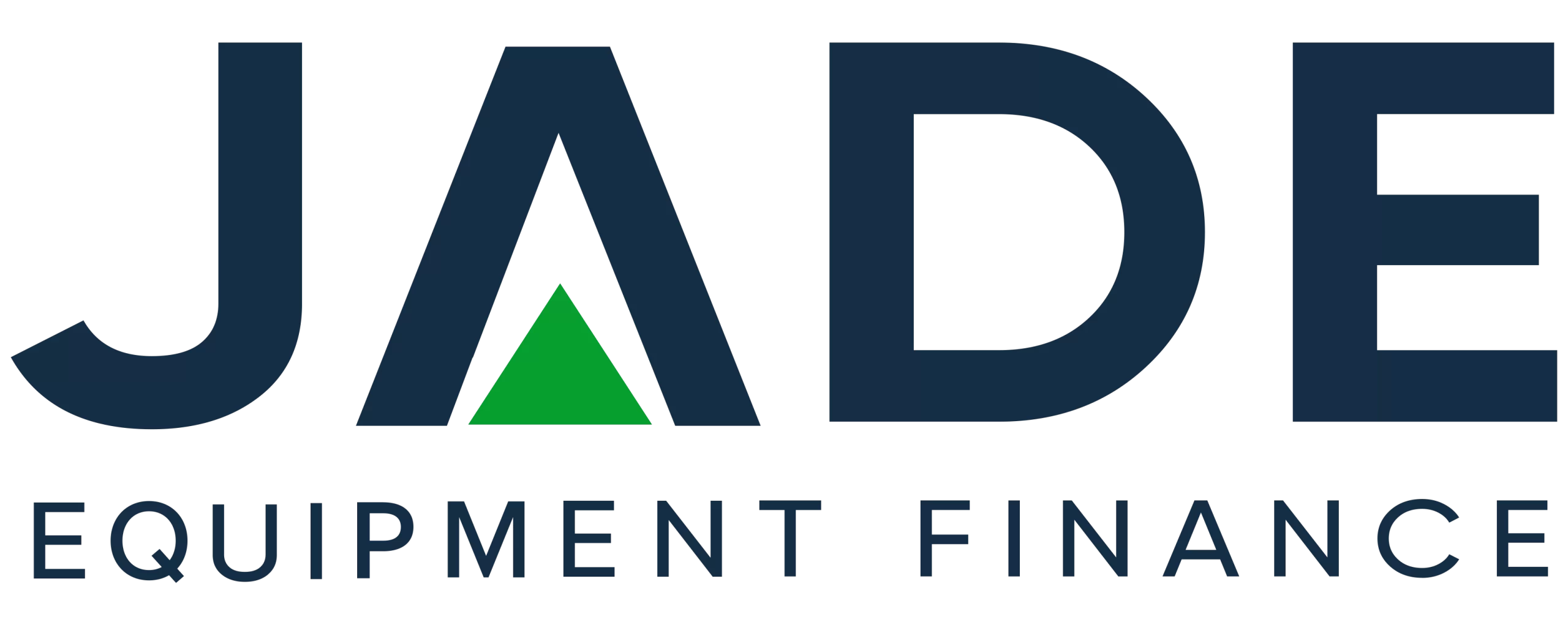While the primary role of Jade Equipment Finance is to source and arrange finance on machinery and equipment, we also consider it our duty as lenders to educate and inform on a range of topics and issues associated with business finance. In this article we're addressing a topic which operators may need to deal with at some stage: when you sell your business and the sale includes equipment which is ‘under finance’. The term ‘under finance’ means finance was used to purchase the equipment and money is still owed on the loan. The equipment is ‘subject to a finance contract’.
When a borrower takes on a finance agreement with any of the products offered through Jade – Chattel Mortgage, Leasing, Rent-to-Own or CHP – the lender holds some form of caveat over the equipment. That varies conceptually depending on the type of finance. For example with Chattel Mortgage the equipment is essentially used as security against the loan. If the borrower defaults on payments the lender has a right to repossess the equipment.
So what happens when you want to sell your business including any equipment which you still owe money on the loan? What’s the process and what are your options? We cover a few scenarios for you to consider.
The Equipment is The Business
There can be multiple scenarios but primarily the equipment itself can essentially be THE business or the major part of the business. That may be say with owner-operators of say one or a few backhoes, excavators or even concreting trucks. Manufacturing operations as well as machining and engineering workshops may also be considered in this scenario. Specialist medical facilities such as x-ray and other radiology services may also be included for a medical equipment finance. Essentially without the equipment there is very little to the business except goodwill and customer contracts and contacts.
In these scenarios the equipment will likely be bundled in the price of purchasing the business.
The Equipment is Integral to the Business
Another scenario is where the equipment is integral but not essential to the business. This may include restaurants, cafes and other hospitality operations as well as retail. The equipment might be individually kitchen equipment, fixtures, furniture and fittings etc.
In these instances, the purchase price of a business may be a price plus the equipment and other stock which is priced or negotiated separately. Sometimes the buyer wants the entire package and sometimes they may want to do their own new fit out and upgrade equipment and not want yours.
These examples may involve separate negotiations on each piece of equipment and in some instances the business seller may be left with equipment that the buyer does not want. They will have to dispose of those machines themselves.
Finance is attached to the Borrower
The key issue is that the finance is attached to the borrower not the business. When establishing your finance contract, your Jade consultant will arrange it in your name or in the name of your business. That contract is not automatically transferable with the sale of the business. The borrower will need to finalise the loan on any equipment prior to completing the business sale.
If you’re working with a business selling agent (essentially a real estate agent for business sales) they will likely advise you, in conjunction with your accountant, on how best to price the sale and what to include. The payout cost may then be included in the purchase price of the business. This would allow the borrower (business seller) to have the funds to payout the loan on settling the business sale.
Your business buyer will likely require all financial encumbrances be finalised before they settle the purchase of the business. This means you may have to payout the finance contract prior to receiving funds from the sale. If you are continuing into another business or have other assets to use as loan security, Jade may be able to assist with short-term finance options.
Your responsibility as the borrower is to finalise the loan. The ownership of the equipment will then be passed from the lender to you and you can pass it on to your buyer with the business sale. Depending on the loan type, security over equipment is released by the lender when the final payment including any balloon or residual is made.
Finalising an Equipment Finance Contract
To finalise an equipment finance contract prior to the end of the loan term, you will need to contact the lender for a payout figure. You will need to either pay that from existing funds or if you are relying on funds from the sale of the business to make the payment, enter some form of arrangement with your business buyer.
Planning Ahead
There are costs and charges involved in setting up a loan and in finalising a loan before the end of the contract. If you do intend to sell your business including the equipment at some time then take that into consideration when establishing your finance with Jade so you avoid paying extra costs.
Jade Equipment Finance consultants are highly skilled finance professionals and will work with you to structure your loan to best meet your requirements. If selling your business is in your mind when you take out a new equipment loan, discuss this with your Jade consultant so we can negotiate the appropriate loan term for you.
For equipment finance quotes and information on topics related to loans, discuss your individual requirements with one of our Jade Equipment Finance on 1300 000 003
DISCLAIMER: THE INFORMATION AND THE DETAILS WHICH HAVE BEEN INCLUDED IN THE ARTICLE IS PROVIDED AS GENERAL INFORMATION ONLY. THERE IS NO INTENTION THAT THIS BE THE ONLY SOURCE OF FINANCIAL INFORMATION FOR THE READER. IT IS INTENDED AS GENERAL IN NATURE. IF A READER CONSIDER THEY REQUIRE FINANCIAL ADVICE AROUND THEIR OWN PERSONAL FINANCES, THEY ARE DIRECTED TO CONSULT WITH A FINANCIAL ADVISOR. NO LIABILITY IS ACCEPTED FOR ANY ERRORS OR MISREPRESENTATIONS OF DATA, FIGURES, FEATURES AND INFORMATION AS SOURCED FROM OTHER SOURCES SUCH AS MANUFACTURERS OR GOVERNMENT DEPARTMENTS AND AUTHORITIES.


